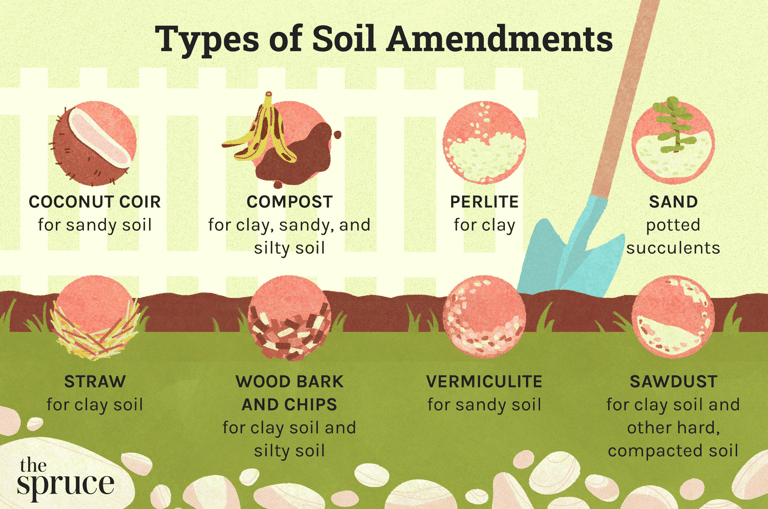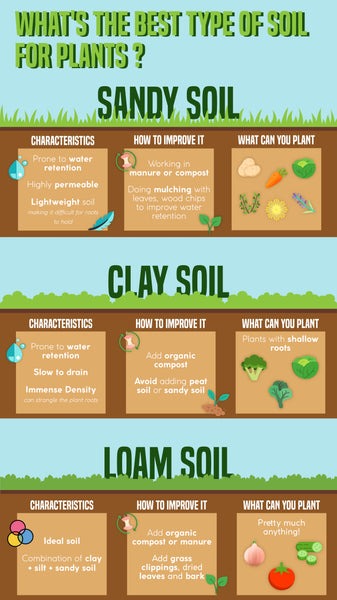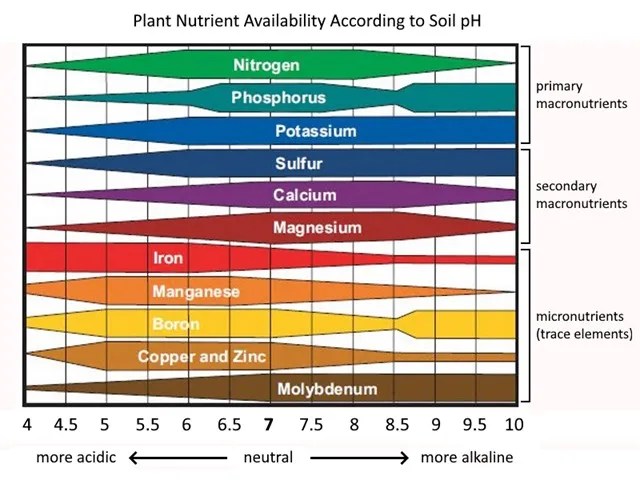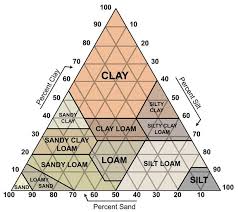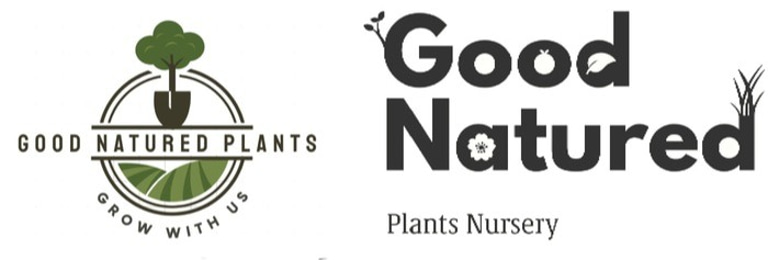Amendment Guide
Water Retention:
Peat Moss: Offers excellent moisture retention and acidity, but raises sustainability concerns. Consider alternatives like coco coir or composted wood products. Bonus: Mention its impact on soil pH and suggest buffering agents like lime if needed.
Coco Coir: A sustainable option from coconut husks, boasts excellent water retention and structure. Highlight: Its neutral pH and suitability for various plants, especially container gardens. Might need to be rinsed to bleach salts prior to planting.
Sphagnum Moss: An acidic powerhouse that retains incredible moisture, but use sparingly due to its potential to compact soil. Suggest: Mixing it with other amendments for improved aeration.
Redwood: Choose aged redwood bark for long-lasting acidity and moisture retention. Mention its larger pieces are ideal for raised beds, while smaller chips work well in containers. Note: Mention potential fungal concerns with fresh redwood and suggest alternatives like composted redwood chips.
Cedar: Similar to redwood, cedar bark offers impressive water retention and acidity with insect-repellent properties. Choose coarse pieces for raised beds and finer flakes for containers. Caution: Mention its strong acidity and suggest moderation for pH-sensitive plants.
Kaolin Clay: A natural or processed clay that improves water and nutrient retention, cation exchange capacity, and soil structure. Kaolin Clay can also reduce water repellence, erosion, and compaction in sandy soils .
Bentonite Clay: A type of clay that is known for its absorbent properties. It can be used to improve water retention and soil aeration, as well as to make a slurry that can be used as a top dressing for gardens. Bentonite Clay can also be used as a fertilizer, as it contains minerals such as molybdenum and zinc .
Aeration and Drainage:
Perlite: Lightweight volcanic rock known for its excellent drainage and aeration. Use cautiously in container mixes due to its tendency to float with heavy watering.
Vermiculite: Micaceous mineral offering both water retention and aeration, making it versatile for various mixes. Its ability to hold nutrients makes it ideal for container gardens.
Sand:
Coarse River Sand: Offers superior drainage and aeration without significant nutrient leaching. Larger surface area provides room for roots and beneficial microbes. Ideal for raised beds and well-draining container mixes.
Playground Sand: Finer texture compared to coarse river sand and can become compacted easily. While it provides drainage, be mindful of potential nutrient loss. Use sparingly in mixes or combine with organic matter for improved water retention.
Decomposed Granite: Finely weathered and eroded form of granite, rich in minerals such as quartz, mica, and feldspar. Decomposed Granite can improve the drainage and aeration of clay and compacted soils, as well as add some nutrients and organic matter. It can also be used as a mulch or a paving material .
Pumice: Long lasting volcanic rock prized for its exceptional drainage and aeration, making it perfect for cacti, succulents, and well-draining container mixes. However it can add significant of weight to the mix.
Lava Rock: Another volcanic rock offering excellent drainage and aeration while retaining heat, beneficial for plants requiring warmer soil temperatures.
Expanded Shale: Budget-friendly and reusable volcanic rock with superb drainage and aeration. Ideal for hydroponics or well-draining container mixes.
Rice Hulls: Lightweight and eco-friendly option, rice hulls improve drainage and aeration while contributing to long-term soil structure due to their slow decomposition rate. Consider them for raised beds and container mixes requiring improved drainage.
Leca: Expanded clay pebbles offering exceptional drainage and aeration. Reusable and sterile, making them perfect for hydroponics or well-draining container mixes.
Calcined Clay: Sold as “no lump” kitty litter, this option holds moisture and nutrients while creating air pockets.
Charcoal: Aquarium charcoal absorbs moisture, reduces odor, and improves drainage. Use sparingly due to its potential to adsorb nutrients.
Pine Bark: As it decomposes, pine bark increases fertility and creates air pockets, but can initially acidify the soil. Suggest: Composting it before use or using aged bark.
Soil Structure Improvement:
Leaf Mold: Shredded or composted leaves enhance soil structure and add organic matter. Explain: Shredded leaves decompose faster, while composted leaves offer more stable structure.
Rice Hulls: As mentioned before, rice hulls not only improve drainage and aeration but also contribute to long-term soil structure due to their slow decomposition rate. Consider them for raised beds and container mixes requiring improved structure.
Nutrient Enrichment:
Compost: A natural and organic material that adds nutrients and organic matter to the soil. It also improves the soil structure and water retention. Compost can be made from kitchen scraps, yard waste, manure, and other organic materials. You can make your own compost or buy it from a garden center. Compost is good for any type of soil that needs more organic matter .
Worm Castings: The excrements of earthworms that feed on organic matter. They are a natural source of fertility and increase soil acidity. Worm castings can be used to enrich the soil with nutrients, enzymes, and beneficial microbes. Worm castings can be produced by vermicomposting or bought from a garden center .
Mushroom Compost:
Adds nutrients and organic matter to the soil, promoting healthy plant growth. Use as part of the organic matter component in potting mix. Add 1 part mushroom compost to potting mix to enrich soil with nutrients and enhance microbial activity.
Chicken Manure: A high-nitrogen manure that can boost plant growth and leaf production. However, it can also burn plants if used fresh or in excess. Chicken manure should be well-composted before use and applied sparingly .
Steer Manure: A low-nitrogen manure that can improve soil fertility and texture. It is less likely to burn plants than chicken manure, but it may contain more weed seeds and salt. Steer manure should also be well-composted before use and applied moderately .
Horse Manure: A moderate-nitrogen manure that can enrich the soil with organic matter and nutrients. It is less odorous than chicken or steer manure, but it may also contain more weed seeds and pathogens. Horse manure should be aged or composted for at least six months before use and applied carefully .
Biochar: A charcoal-like material that is produced by burning organic matter at high temperatures in a low-oxygen environment. It increases water and nutrient retention, promotes microbial activity, and sequesters carbon in the soil. Biochar can be used to improve soil fertility, reduce greenhouse gas emissions, and enhance plant growth .
pH Adjustment:
Sulfur: A natural element that can lower the soil pH, making it more acidic. Sulfur can be used to correct alkaline soil or to grow acid-loving plants, such as blueberries, azaleas, and rhododendrons. Sulfur should be applied in small amounts and mixed well with the soil.
Sulfur can take several months to affect the soil pH, so it should be applied well in advance of planting. Sulfur can be found in various forms:
Elemental Sulfur (Slow)
Iron Sulfate (Medium)
Aluminum Sulfate (Fast)
Lime: A natural or processed material that can raise the soil pH, making it more alkaline. Lime can be used to correct acidic soil or to grow alkaline-loving plants, such as cactus and succulents. Lime can be either calcitic (containing calcium) or dolomitic (containing calcium and magnesium). Lime should be applied in small amounts and mixed well with the soil.
Lime can take several weeks to affect the soil pH, so it should be applied before planting. Lime can be found in various forms.
Dolomite Lime (Slow)
Wood Ash (Medium)
Hydrated Lime (Fast)
Note: Testing your soil pH is important for ensuring that your plants can absorb the nutrients they need. Different plants have different pH preferences, and some nutrients are more available at certain pH levels.
You can test your soil pH using a simple kit or a meter that you can buy from a garden center or online. You should test your soil pH at least once a year, preferably in the spring or fall, and adjust it accordingly .
